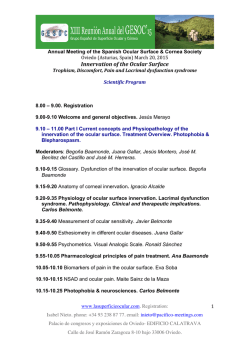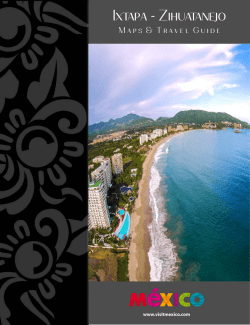
Spain 10 - Cantabria Asturias - Lonely Planet
©Lonely Planet Publications Pty Ltd Cantabria & Asturias Why Go? Cantabria. . . . . . . . . . . Santander . . . . . . . . . . Asturias . . . . . . . . . . . . Oviedo . . . . . . . . . . . . . Gijón. . . . . . . . . . . . . . . Picos de Europa. . . . . 457 457 470 471 477 489 Best Places to Eat ¨¨La Conveniente (p461) ¨¨La Corrada del Obispo (p475) ¨¨El Molín de la Pedrera You can traverse either of these two regions from north to south in little more than an hour. But don’t. The coastline is a sequence of sheer cliffs, beautiful beaches and small fishing ports. Behind it, gorgeously green river valleys dotted with stone-built villages rise to the 2000m-plus mountain wall of the Cordillera Cantábrica, which reaches majestic heights in the Picos de Europa. The beauty is endless and ever-changing. The damp climate makes sure that you’ll eat and drink well too: on offer are quality meat, local cheeses, and cider from Asturias’ apple orchards, as well as the fruits of the sea. And travellers with a feel for history will be in their element: early humans painted some of the world’s most magnificent prehistoric art at Altamira and elsewhere, and it was at Covadonga in Asturias that the seed of the Spanish nation first sprouted 1300 years ago. (p492) ¨¨Asubio Gastrobar (p461) ¨¨Real Balneario de Salinas (p484) Best Places to Stay ¨¨La Casa de las Chimeneas (p497) ¨¨La Posada de Babel (p481) ¨¨La Casona de Amandi (p480) ¨¨Posada del Valle (p490) ¨¨Hotel del Oso (p498) When to Go Oviedo °C/°F Temp Rainfall Inches/mm 40/104 8/200 30/86 6/150 20/68 4/100 10/50 2/50 0 0/32 J F M May, Jun & Sep Best time: temperatures are up, rainfall and prices are down, crowds are away. A M J J A Aug Descenso Internacional del Sella – kayak mania from Arriondas to Ribadesella. S O N D Late Aug Join thousands of tipplers at Gijón’s Fiesta de la Sidra Natural (Natural Cider Festival). 455 Cave Art ITINERARIES Five Days Get friendly with Santander for a day, then make your way along the west coast of Cantabria, taking in medieval Santillana del Mar, the Cueva de Altamira, and Modernista Comillas. Wander the Picos de Europa for a day or two and wrap up with civilised Oviedo. Ten Days Follow the five-day itinerary and explore further into the Picos before heading west to Oviedo. Cycle the Senda del Oso and finish off with Gijón and Asturias’ west coast towns. Top Five Food Experiences ¨¨El bulevar de la sidra (p475) Teeming with dozens of overflowing cider bars, Oviedo’s Calle de la Gascona is the epicentre of Asturias’ cider scene. ¨¨La Conveniente (p461) One of Santander’s finest Nearly all of Spain’s estimated 240 surviving brown bears live in Asturias or Cantabria (p487). Best Beaches ¨¨Playa del Silencio (p485) ¨¨Playa de Rodiles (p479) ¨¨Playa de Torimbia (p481) ¨¨Playa del Sardinero (p459) ¨¨Playa de Merón (p470) Best Picos de Europa Walks ¨¨Teleférico de Fuente Dé to Collado de Horcados Rojos (p498) ¨¨Garganta del Cares (p494) ¨¨Sotres to Vega de Urriello, via the Collado de Pandébano (p495) ¨¨Lago de la Ercina to Vega de Ario (p492) ¨¨Sotres to Urdón, via the Desfiladero de la Hermida (p495) Top Festivals ¨¨Fiesta de la Sidra Natural (p477) ¨¨Festival Internacional de Santander (p460) bodegas, cavernous and packed out, with huge tablas (platters) of fantastic cheeses, meats and pâtés. ¨¨Descenso Internacional ¨¨Picos de Europa blue cheeses (p463) Venture into the ¨¨Fiesta del Orujo (p496) pungent world of queso Picón and queso de Cabrales, where every bite has its kick. ¨¨Mercado La Esperanza (p460) Santander’s colourful food market bursts with fresh seafood, meat, cheese and fruit. ¨¨Sensational seafood Fresh from the Bay of Biscay, everywhere along the coast. del Sella (p480) ¨¨Semana Grande (p460) Ca nta bria & As t u rias The scattered caves of Cantabria and Asturias are home to some of the oldest and most superlative prehistoric art in the world, painted by early humankind between around 39,000 and 10,000 BC. Most of the images depict wild animals such as horses, deer, bison and mammoths, and in the best examples the fluidity of the drawing, the skilful employment of colour and relief, and the lifelike animal representations attain the level of artistic genius. Getting a close-up view of this work, created by hunter-gatherers living an arduous existence during the last Ice Age – probably as some form of homage or worship – is truly awe-inspiring. The world-famous bison and other beasts of the Cueva de Altamira (p468) have been on the World Heritage List since 1985, but there’s plenty more. In 2008 a further 17 Palaeolithic art caves in northern Spain were added to the list, including Ribadesella’s Cueva de Tito Bustillo (p487) and Cantabria’s Cueva de Covalanas (p464), whose intricate�ly designed deer depictions are true artistic masterpieces. In 2012, a red symbol at Puente Viesgo’s Cueva de El Castillo (p462) was named the oldest cave art in the world. BEAR FACTS
© Copyright 2026






